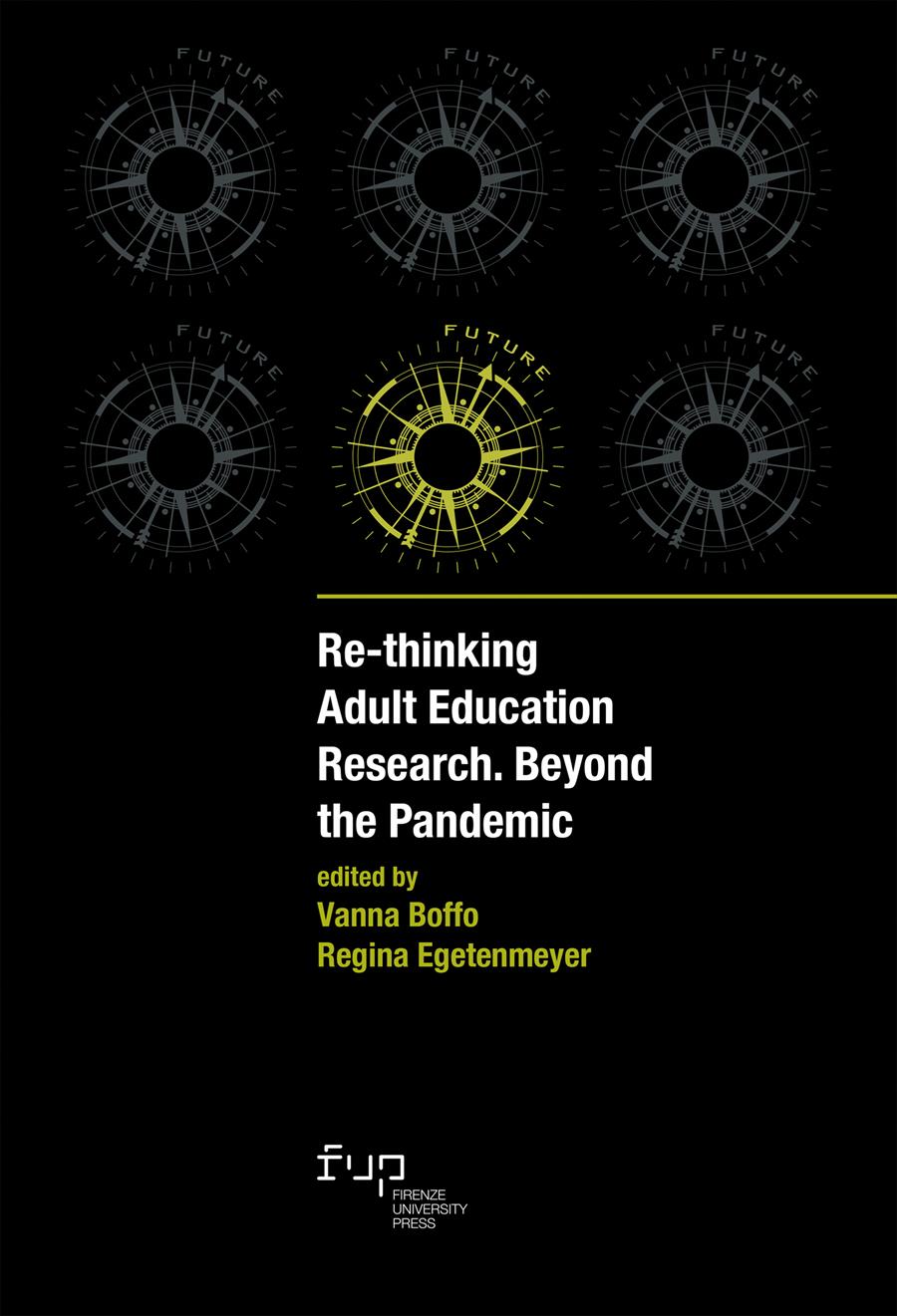- Re-thinking Adult Education Research. Beyond the Pandemic
- Edited by Vanna Boffo, Regina Egetenmeyer
Institutional Learning in Higher Education and Graduate Transitions
- Paolo Federighi
- © 2023 Author(s) |
- CC BY 4.0
- DOI: 10.36253/979-12-215-0151-3.04
The ‘learning exclusion equilibrium’ strategy in Italy also governs young adults’ possibilities of accessing higher education institutions (HEIs) and entering and being successful on the labour market. The upshot of this strategy has been to weaken the social role of universities and open the field to new players promoting new solutions based on stronger teaching and research partnerships. After graduation, young university leavers face a period in which they follow non-linear paths as they try to fit their skills to the labour market demand. For many professions, there has been an immense change in this demand. Now, unlike the past, life skills are considered basic competences for technical professions too. If those lacking these skills enter the labour market later, the problem arises of how to create these competences both during the period of university education and in the following years. Universities have to practise institutional learning and study with those who need knowledge in order to come up with a new strategy so that their graduates can directly manages their relations with the labour market. Knowledge of the situation and development of graduates’ professional lives is needed in order to give academic programmes a new direction and allow students to make an informed choice of which university to enrol in. The European Graduate Tracking Initiative can lead the way towards this goal.
- Keywords:
- Cooperation and Ecosystem,
- Graduate Tracking,
- Higher Education,
- Institutional Learning,
- Life Skills,
University of Florence, Italy - ORCID: 0000-0001-5041-7443
- Anelli, Massimo. 2018. University To Work Transition. Policy Brief 08, Employment Skills and Productivity in Italy. <https://www.unibocconi.eu/wps/wcm/connect/84e6aa5b-3c13-4ab4-8101-ffd5d8372928/PB+0_Massimo+Anelli.pdf?MOD=AJPERES&CVID=myFFqQ> (2023-03-15).
- Assoknowledge and Università La Sapienza. 2015. Rapporto sul mercato delle Corporate University in Italia. <http://www.assoknowledge.org/news/rapporto-annuale-sul-mercato-delle-corporate-universities-in-italia> (2023-03-15).
- Boffo, Vanna, and Monica Fedeli. 2018. Employability & Competences. Innovative Curricula for New Professions. Florence: Firenze University Press.
- Boffo, Vanna. 2020. “Sostenere l’Employability dei giovani adulti: il Career Service in Alta Formazione”. Lifelong Lifewide Learning, 16 (35): 56-70.
- Cascioli, Raffaella. 2021. “The Employment Prospects of Young Graduates in Italy During and After the 2008 Crisis.” Economie et Statistique / Economics and Statistics 522-523: 43-59.
- Council of the European Union. 2017. Council Recommendation of 20 November 2017 on Tracking Graduates (Text with EEA relevance) (2017/C 423/01). <https://eur-lex.europa.eu/legal-content/EN/TXT/PDF/?uri=CELEX:32017H1209(01)&rid=5> (2023-03-15).
- Craig, Ryan. 2018. “Planned Obsolescence.” Inside Higher Education. 22 March. <https://www.insidehighered.com/views/2018/03/23/colleges-should-more-regularly-kill-academic-programs-underperforming-opinion> (2023-03-15).
- Del Gobbo, Giovanna. 2021. “Valutazione di sistema e cultura della qualità: itinerari di ricerca e formazione per le università.” Nuova Secondaria 10: 99-110.
- Donald, William E. 2021. Conceptualisation of a New “Early Careers Talent Pipeline” Framework: Enhancing Organisational Sustainability via Feedback-Seeking Behaviour. Brighton, UK: Graduate Recruitment Bureau.
- European Commission. 2020. Recommendation for a Council Recommendation on the 2020 National Reform Programme of Italy and Delivering a Council Opinion on the 2020 Stability Programme of Italy. Brussels: EUR-Lex, Access to European Union law. <https://eur-lex.europa.eu/legal-content/EN/TXT/?uri=CELEX:52020DC0512> (2023-03-15).
- European Commission. 2022. Communication from the Commission to the European Parliament, the Council, the European Economic and Social Committee and the Committee of the Regions on a European Strategy for Universities, {SWD(2022) 6 final}. Strasbourg: European Commission. <https://education.ec.europa.eu/document/commission-communication-on-a-european-strategy-for-universities> (2023-03-15).
- EY, Pearson and ManpowerGroup. 2021. Il Futuro delle Competenze in Italia. Job 2030. <https://it.pearson.com/orientamento-softskills/professioni2030.html> (2023-03-15).
- Finegold, David, and David Soskice. 1988. “The Failure of Training In Britain: Analysis and Prescription.” Oxford Review of Economic Policy 4 (3): 21-53.
- Fitzpatrick, Kathleen. 2011. Planned Obsolescence: Publishing, Technology, and the Future of the Academy. New York: New York University Press.
- Nübler, Irmgard. 2016. New Technologies: A Jobless Future or Golden Age of Job Creation? International Labour Office, Research Department. Geneva: ILO.
- Pastore, Francesco. 2017. Why So Slow? The School-to-Work Transition in Italy. IZA DP No. 10767. <https://docs.iza.org/dp10767.pdf> (2023-03-15).
- Rospigliosi, Asher P., Greener, Sue, Sheehan, Maura, and Tom Bourner. 2014. “Human Capital or Signalling – Unpacking the Graduate Premium.” International Journal of Social Economics 41 (5): 420-32. DOI: 10.1108/IJSE-03-2013-0056
- Salas-Velasco, Manuel. 2021. “Mapping the (Mis)match of University Degrees in the Graduate Labor Market.” Journal for Labour Market Research 55 (14). DOI: 10.1186/s12651-021-00297-x
- Slowey, Maria. 2016. Comparative Adult Education and Learning. Florence: Florence University Press. DOI: 10.36253/978-88-6453-422-0
- Smith, Herbert L. 1986. “Overeducation and Underemployment: An Agnostic Review.” Sociology of Education 59 (2): 85-99.
- Torlone, Francesca. 2018. Apprendimento istituzionale e politiche educative regionali. Roma: Aracne.
Chapter Information
Chapter Title
Institutional Learning in Higher Education and Graduate Transitions
Authors
Paolo Federighi
Language
English
DOI
10.36253/979-12-215-0151-3.04
Peer Reviewed
Publication Year
2023
Copyright Information
© 2023 Author(s)
Content License
Metadata License
Bibliographic Information
Book Title
Re-thinking Adult Education Research. Beyond the Pandemic
Editors
Vanna Boffo, Regina Egetenmeyer
Peer Reviewed
Number of Pages
284
Publication Year
2023
Copyright Information
© 2023 Author(s)
Content License
Metadata License
Publisher Name
Firenze University Press
DOI
10.36253/979-12-215-0151-3
ISBN Print
979-12-215-0150-6
eISBN (pdf)
979-12-215-0151-3
eISBN (xml)
979-12-215-0152-0
Series Title
Studies on Adult Learning and Education
Series ISSN
2704-596X
Series E-ISSN
2704-5781
